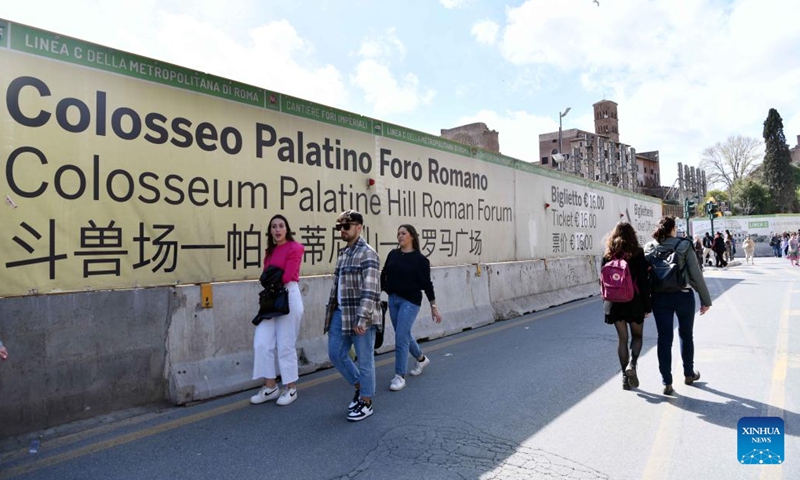
People walk past tourist information in various languages including Chinese near the Colosseum in Rome, Italy, on March 26, 2023. Photo: Xinhua
Italy is miscalculating if it thinks it can obtain something from the US by sacrificing multilateral cooperation with China's Belt and Road Initiative, Chinese experts said in response to the Italian government's wavering stance on the BRI deal.
The remarks came as the Italian Prime Minister Giorgia Meloni reportedly mulled pulling Italy out of the joint initiative, which the country signed with China in 2019, during her visit to the US this week.
Speaking with the
Global Times in an exclusive written interview, Chinese Ambassador to Italy Jia Guide said that the MOU on cooperation within the framework of the BRI between China and Italy is a mutually beneficial and win-win document.
"After the MOU was signed, the strategic level of China-Italy relations was further enhanced, and Italy's priority position in China's foreign relations and the importance of China-Italy relations in the context of China-Europe relations were significantly elevated," Jia said, adding that the practical cooperation in various fields has brought tangible benefits and positive effects for both nations and their people.
Italy signed the BRI deal in 2019 during the tenure of former prime minister Giuseppe Conte. However, in recent months, there has been ongoing speculation that Meloni's government is contemplating reversing that decision.
It is still unclear if Italy will pull out of the BRI.
During her visit to the US, Meloni said that she and US President Joe Biden discussed Italy's participation in China's BRI, but Washington's approach was not to dictate Italy's policy on China, Reuters reported on Friday.
Despite Meloni's remarks, experts said that it is clear that the Italian prime minister is coming under pressure from the US.
Cui Hongjian, director of the Department of European Studies at the China Institute of International Studies, told the Global Times that it is essential to emphasize the concept of autonomy, especially since Italy is facing pressure from the US.
"The approach adopted by the US is ultimately not beneficial for the economies of European countries, including Italy, as it is exclusive and driven by unilateralism and protectionism. In stark contrast, China advocates free trade and an open economy, which are the true core values of cooperation, particularly in the context of the BRI," Cui said.
For Italy, the idea of sacrificing cooperation with China under BRI to gain something from the US is a miscalculation, Cui further noted.
Italy's wavering stance may also indicate that it wants to negotiate with China over some trade matters such as trade deficits, which have often been brought up, experts said.
In 2022, the trade volume between China and Italy reached $77.884 billion, a year-on-year increase of 5.4 percent. China's exports to Italy amounted to $50.908 billion, a year-on-year increase of 16.8 percent, while China's imports from Italy was $26.976 billion, a year-on-year decrease of 11 percent, data from the General Administration of Customs shows.
"They (Italy) would like China to increase imports of their goods and help address certain investment issues…moreover, BRI cooperation is guided by policies, and ultimately, it is determined by market forces. Italy cannot attribute its own product competitiveness issues to China and place the blame on China," Cui said.
China has also been doing its part to help Italy introduce more goods to the Chinese market. For example, Italy has been consistently invited to participate in important international exhibitions in China. It was once the guest of honor at the China International Import Expo, and this April, it participated as the only guest of honor at the third China International Consumer Products Expo.
Italy has signed with China a total of nine documents related to the inspection and quarantine of Italian agricultural products, ranking high among European countries.
Furthermore, the Italian government should take a long-term and broader perspective and understand that apart from trade, there is still an increment in Chinese-Italian cooperation in industries, investments, and finance, the expert said.
Bilateral investment between China and Italy has also experienced rapid growth. The one-billion yuan "Panda Bond" was successfully issued by Italian authorities, the first such issuance by the National Promotional Institute confirmed by the European Union.
China's first seismo-electromagnetic satellite, known as Zhangheng 1, with Italian high-energy particle detectors on board, plays an active role in earthquake early warning and disaster prevention and mitigation.
The two countries have achieved a series of visible outcomes in projects related to shipbuilding, offshore wind power, and third-party market cooperation.




